
Oracle Fusion SCM Certification Training Course
Have Queries? Call Us
+91 73960 33555
600+
Students Trained
5 ***** (657)
Ratings
50 Days
Duration
Course Demo Video

Our Students Work At
Oracle Fusion SCM Online Training Course Details
Introduction To Oracle Fusion SCM Online Training
What you’ll learn
- Understand Fusion Cloud Application, Navigation, FSM and Security in Fusion Cloud
- Master and implement Oracle Fusion Product Data Hub
- Master and implement Oracle Fusion Inventory Management
- Master and implement Oracle Fusion Procurement
- Master and implement Oracle Fusion Manufacturing
- Master and implement Oracle Fusion Sourcing
- Master and implement Oracle Fusion Order Management
- Configure Fusion SCM Modules Hands on for a Live Project
- Master All SCM Technical Skills – FBDI, SDL, BIP, OTBI
- We will provide most comprehensive certification guidance and work closely with you
- We will help you with Resume and Interview Preparation
Demo Session Links:
- Oracle Fusion SCM Training Demo Session Day 1 – https://youtu.be/kxBLWrJIx-0
- Oracle Fusion SCM Training Demo Session Day 2 – https://youtu.be/fP2LbVbJXOc
- Oracle Fusion SCM Training Demo Session Day 3 – https://youtu.be/Mt35hUkK5CM
- Oracle Fusion SCM Training Demo Session Day 4 – https://youtu.be/yhYVp-sgaBE
Who this course is for:
- Any IT experienced Professional who want to build career as Oracle Fusion SCM Consultant
- Graduates or post graduates who want to Jump Start their career as Oracle Fusion SCM Consultant
- Freshers who want to get an IT job with great pay
Prerequisites:
We will cover these topics as part of Oracle Fusion SCM Online Training course.
- Basics of Fusion SCM Cloud
- Minimal Knowledge of Supply Chain Management processes and practices
Why Enrol in Oracle Fusion SCM Course?
Fusion Cloud SCM Consultants are in great demand today and there are 1000s of Jobs in the job market
With Oracle Supply Chain Management (SCM) & Manufacturing, Many Organizations respond quickly to changing demand, supply, and market conditions.
The average annual pay for an Oracle Fusion SCM Consultant in the United States is $160,160 a year - Ziprecruiter.com
Why Choose Us

Learn from the Best
We have got the certified training experts with domain expertise to train you

Real Time Implementation Projects
We will use real time implementation scenarios to explain the course content

Interactive Online Training Sessions
Expert trainers take highly interactive live training sessions and we do share the training videos

Resume, Interview & Job Assistance
We will help you with resume preparation, train you for the interviews, and provide job assistance

Live Demos
You can attend up to 3 live demo classes before you join the course

24*7 Support
We work round the clock and respond to your queries promptly
Google Reviews from Students!!
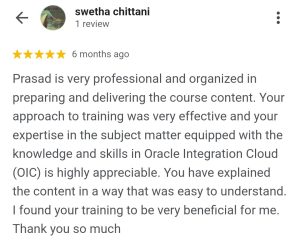
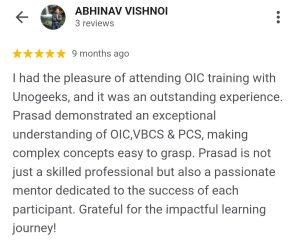
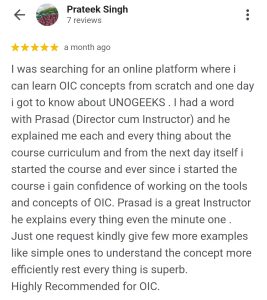
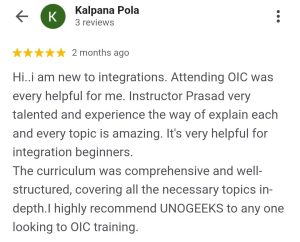
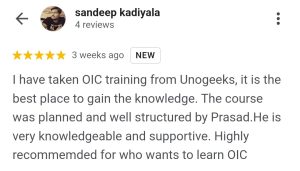
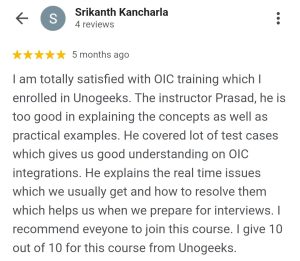
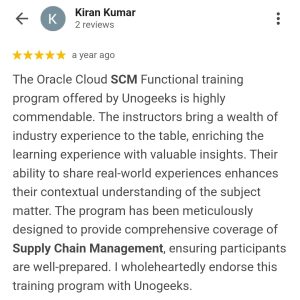
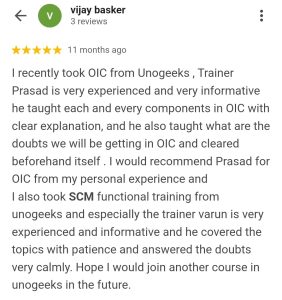
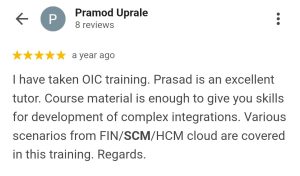
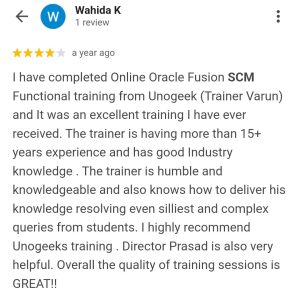
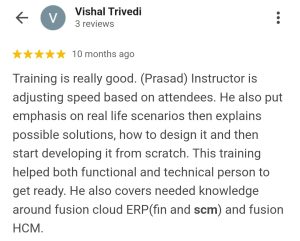
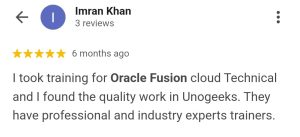
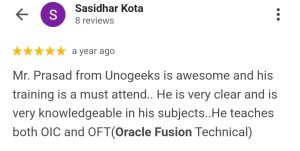
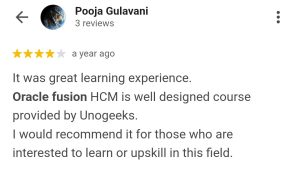
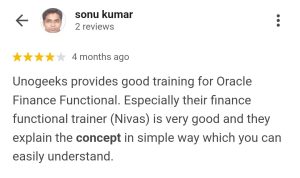
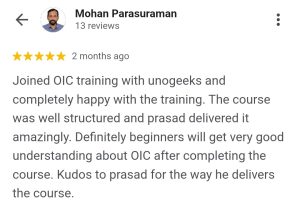
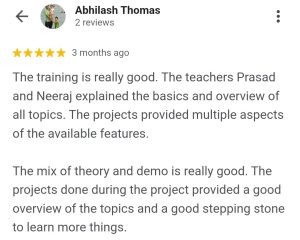

2000+
Batches Completed
20000+
Happy Students
5 *****
Star Ratings
50+
Expert Trainers
Oracle Fusion SCM Training Course Curriculum
- Introduction to Oracle SCM Cloud
- Oracle Cloud Application Product Families
- SaaS, PaaS and IaaS overview
- Oracle SCM Cloud Capabilities: Overview
- Technical Components Overview
- Explain Course Content in Detail
- Navigation in Oracle Cloud applications
- News Feed home page layout
- Banner Layout
- How to switch between layouts with sandbox
- Dashboards in Oracle Cloud applications
- Work Areas and Infotiles
- Tasks Panel – Access tasks, perform searches, run reports
- Infolets – Summary View, facilitates drilldown, Personalize
- Set User Preferences, save custom searches, Configure table columns
- Role based access control - RBAC
- Configure security framework using Privileges, Duty roles, Job Roles, Abstract roles
- Assigning job roles to user and see the changes in application UI
- Create a custom role and compare it to standard role
- Explain other options available in IT Security Console
- Grant Data Access to user
- Implementation Project Planning
- Roles and Responsibilities
- Offerings
- Implementation Considerations
- SCM Simplified Setup: Overview
- Automated Setup of SCM Common Components
- Simplified Setup: Time Savings
- Best Practices
- Explain Value Sets, Flexfields and Lookups on a high level
- Create 5 different types of Value Sets and use them in Flexfields configuration
- Configure Descriptive Flexfields (DFF), deploy and test it in application
- Configure Extensible Flexfields (EFF), deploy and test it in application
- Configure Key Flexfields (KFF), deploy and test it in application
- Explain configuration levels of lookups
- Enterprise Structure Walkthrough
- EBS vs Fusion Cloud Org Structure
- COA Overview
- Ledger Creation
- Legal Entity
- Business Unit Creation
- Inventory Org Creation
- How Inventory Fits into Oracle’s SCM Cloud Offering
- Oracle's SCM Cloud Progress
- Oracle Inventory Management Cloud Capabilities: Overview
- Create Item Classifications & setting up security
- Define UOM
- Item Life Cycle Phases
- Item Attribute Groups
- Item Classes
- Item Statuses
- Item Types
- Inventory Transaction Uses
- Inventory Transaction Sources and Types
- System- and User-defined Inventory Transaction Types
- Inventory Transaction Setup Tasks
- Lot Control: Overview
- Lot Control Organization Parameters
- Lot Control Item Attributes
- Lot Management
- Serial Number Control
- Lot and Serial Number Control Profile Options
- On-Hand Quantity and Availability
- Manage Item Quantities Page
- Reservations
- Inventory Transactions: Overview
- Miscellaneous Transactions
- Subinventory Transfers
- Movement Requests – Approval check
- Direct and In-Transit Interorganization Transfers
- Transfer Orders
- Receiving: Overview
- Receipt Routing
- Receipt Processing Methods
- Expected Receipts
- Receipt Structure
- Returns and Corrections
- Additional Receiving Features
- Receiving Parameters
- Explain Min-Max Planning
- Min-Max Planning Report Parameters: Points to Consider
- Min-Max Planning Replenishment Quantities Calculation
- Cycle Counting: Explained with ABC Analysis
- Create and Manage Cycle Counts
- Generate Count Schedules and Sequences
- Analyze Materials Management and Logistics Performance
- Monitor Warehouse Operations Dashboard
- Explain Procurement architecture and components
- Explain simplified Procure to Pay flow
- Explain Procurement applications integration
- Identify common procurement tasks
- Configure required common procurement tasks
- Define Common Payables and Procurement Options
- Procurement Document Numbering
- Define Common Purchasing Configuration
- Procurement Agents
- Understand the approval management workflow
- Set up approval management
- Understand approval policy configuration
- Describe steps for defining approval groups
- Manage, edit, and deploy approval rules
- Create approval rule conditions
- Understand the transaction account builder for Procurement
- Set up Mapping Set
- Set up account rules
- Set up TAD
- Assign the TAD to Procurement
- Explain purpose and use of Supplier Model within Fusion Procurement
- List the benefits provided to suppliers by Fusion Supplier Portal
- Explain the methods available for registering suppliers
- Identify the job roles available to the supplier self-service administrator to provision
- Implement Supplier Model and Supplier Portal
- Identify Self Service Procurement setup tasks and profile options
- Manage value sets and descriptive flexfields for information templates
- Create, manage, and secure catalog
- Understand Supplier Content Map Sets
- Create local and informational catalogs
- Create and manage public shopping lists
- Create and manage smart forms
- Understand content zones
- Understand the basics of requisition management
- Manage requisitions
- Create and modify approved orders
- Set up charge, variance and accrual accounts
- Understand the components and use of purchase orders
- Create and Manage purchase orders
- Understand setup options related to purchase orders
- Create Negotiation Styles
- Create Negotiation Templates
- Setup Attribute Lists
- Define Cost Factors
- Create Cost Factor Lists
- Manage Sourcing Value sets
- Create Sourcing Descriptive Flexfields
- RFI Creation
- RFQ Creation
- Award Process
- Sourcing Approvals
- Surrogate Responses
- Online Messages
- Create and Submit Order
- View Fulfillment Lines and Orchestration Plan
- Order Business Flow
- Order Management Integrations
- Setup Pricing Strategy
- Pricing segment
- Manage Price List
- Manage Discount List
- Manage Simple Discount
- Manage Tier Based Discounts
- Manage Shipping Charges List
- Assignment pricing strategy
- Define Global Price List
- Architecture and Components
- Key functionalities of Global Order Promising
- Global Sourcing Rules
- Local Sourcing Rules
- ATP Rules
- Data Collection
- Global Order Promising Engine Restart
- Real-Time Supply Updates
- Manage Shipping Value Sets
- Manage Shipping Lookups
- Manage Release Sequence Rules
- Manage Pick Slip Grouping Rules
- Manage Picking Rules
- Manage Shipping Parameters
- Manage Ship Confirm Rules
- Create Custom Hold Type and Reasons
- Apply and Release Holds
- Verify Hold Details
- Create Record Set
- Create Validation Rule Set
- Create Constraints
- Review Order Orchestration
- Create custom orchestration rules
- Assign orchestration rules to sales order
- Custom order transformation rules
- Build SQL Queries and Creating Data Model
- Design report layout using RTF
- Register and execute BIP report as ESS Job
- Test and explore ESS Job Submission options from scheduled processes
- Build OTBI Detail Report
- Build OTBI Summary Report
- OTBI Dashboards
- FBDI Overview
- Data file preparation in FBDI format
- Execute File Based Data Import (FBDI) process
- Error handling and reconciliation
- SDL Overview
- Data file preparation in SDL format
- Execute Spreadsheet Data Loader (SDL) process
- Error handling and reconciliation
- Introduction to Sandboxes
- Make changes in UI with sandbox – Ex: Make fields required/read only/hidden
- Use expression language to write complex conditional logic
- Implement Fusion SCM modules for a Live Project
- Understand the requirement and come up with config workbooks
- Configure SCM Modules as per Config workbook
- Implement SCM Modules as per Config Workbooks
- Test the setups
- We will provide most comprehensive guidance in Fusion SCM Certification
- We will share couple of resumes and help you to come up with Perfect Fusion SCM resume
- We will teach all possible interview questions in Fusion SCM
Upcoming Batch Schedule
WeekDay Batch 1
Monday – Saturday

07:00 – 08:30 AM (IST)
WeekDay Batch 2
Monday – Friday

08:30 – 10:00 AM (IST)
WeekDay Batch 3
Monday – Friday

07:00 – 08:30 PM (IST)
WeekEnd Batch 1
Saturday – Sunday

06:30 – 09:30 AM (IST)
WeekEnd Batch 2
Saturday – Sunday

05:00 – 08:00 PM (IST)
Contact Us To Enroll
Our Students Work At
WANT TO KNOW MORE ABOUT OUR COMPANY? CURIOUS WHAT ELSE WE DO?
Click Here to contact us
